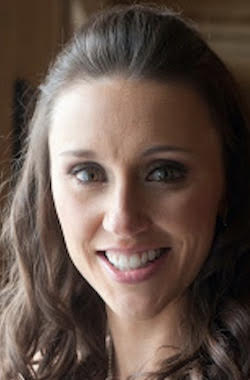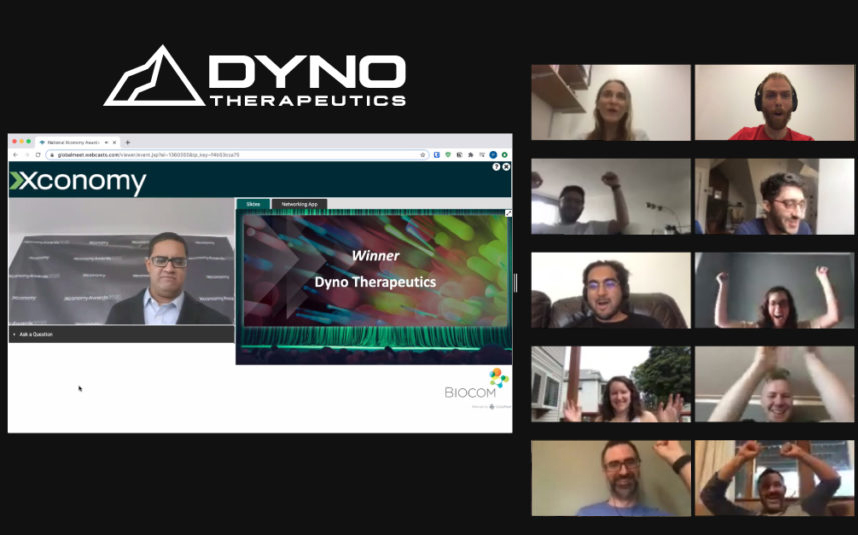Dyno sponsors ASGCT virtual career fair
Cambridge, Mass., May 12, 2020 – Dyno Therapeutics, a biotechnology company applying artificial intelligence (AI) to gene therapy, today announced two presentations and a poster at the American Society of Gene and Cell Therapy (ASGCT) conference being held as a virtual meeting on May 12-15, 2020.
Details for the presentations and poster are as follows:
Presentations
Title: Artificial intelligence powered design of synthetic AAV capsids without pre-existing immunity for the universal treatment of all patients
Presenter: Eric Kelsic, Ph.D., Chief Executive Officer and Co-founder, Dyno Therapeutics
Education Session Title: Synthetic Biology Meets Immunology: DNA and RNA Tools
Date and Time: Tuesday May 12, 2020; 2:40 – 3:15 p.m.
Title: Massively Parallel Deep Diversification of AAV Capsid Proteins by Machine Learning
Presenter: Sam Sinai, Ph.D., Lead Machine Learning Scientist and Co-founder, Dyno Therapeutics
Date and Time: Wednesday May 13, 2020; 4:30 – 4:45 p.m.
Oral Abstract Session Title: Vector and Cell Engineering, Production or Manufacturing III
Abstract Number: 541
Poster
Title: Accurately Quantifying Transduction within Barcoded AAV Capsid Libraries via Tracking of Single-Molecule ID Tags
Presenters: Kathy Lin, Ph.D., Computational Biology Scientist, and Jeff Gerold, Ph.D., Head of Data Science, Dyno Therapeutics
Date and Time: Thursday, May 14, 2020; 5:30 – 6:30 p.m.
Poster Session Title: AAV Vectors – Virology and Vectorology
Abstract Number: 1006
This poster will be available under the Publications section of the Dyno Therapeutics website at the time of the presentation at www.dynotx.com.
ASGCT Virtual Career Fair
Also at ASGCT 2020, Dyno is the main sponsor of the virtual career fair. Dyno is actively recruiting as the company continues to grow its current team of 20 employees and expects to double in the next year. Current listings can be found at the ASGCT Career Fair website and at www.dynotx.com.
About CapsidMap™ for Designing AAV Gene Therapies
By designing capsids that confer improved functional properties to Adeno-Associated Virus (AAV) vectors, Dyno’s proprietary CapsidMap™ platform overcomes the limitations of today’s gene therapies on the market and in development. Today’s treatments are primarily confined to a small number of naturally occurring AAV vectors that are limited by delivery, immunity, packaging size, and manufacturing challenges. CapsidMap uses artificial intelligence (AI) technology for the design of novel capsids, the cell-targeting protein shell of viral vectors. The CapsidMap platform applies leading-edge DNA library synthesis and next generation DNA sequencing to measure in vivo gene delivery properties in high throughput. At the core of CapsidMap are advanced search algorithms leveraging machine learning and Dyno’s massive quantities of experimental data, that together build a comprehensive map of sequence space and thereby accelerate the discovery and optimization of synthetic AAV capsids.
Dyno’s technology platform builds on certain intellectual property developed in the lab of George Church, Ph.D., who is Robert Winthrop Professor of Genetics at Harvard Medical School (HMS), a Core Faculty member at Harvard’s Wyss Institute for Biologically Inspired Engineering, and a co-founder of Dyno. Several of the technical breakthroughs that enabled Dyno’s approach to optimize synthetic AAV capsid engineering were described in a November 2019 publication in the journal Science, based on work conducted by Dyno founders and members of the Church Lab at HMS and the Wyss Institute. Dyno has an exclusive option to enter into a license agreement with Harvard University for this technology.
About Dyno Therapeutics
Dyno Therapeutics is a pioneer in applying artificial intelligence (AI) and quantitative high-throughput in vivo experimentation to gene therapy. The company’s proprietary CapsidMap™ platform is designed to rapidly discover and systematically optimize superior Adeno-Associated Virus (AAV) capsid vectors with delivery properties that significantly improve upon current approaches to gene therapy and expand the range of diseases treatable with gene therapies. Dyno was founded in 2018 by experienced biotech entrepreneurs and leading scientists in the fields of gene therapy and machine learning. The company is located in Cambridge, Massachusetts. Visit www.dynotx.com for additional information.


